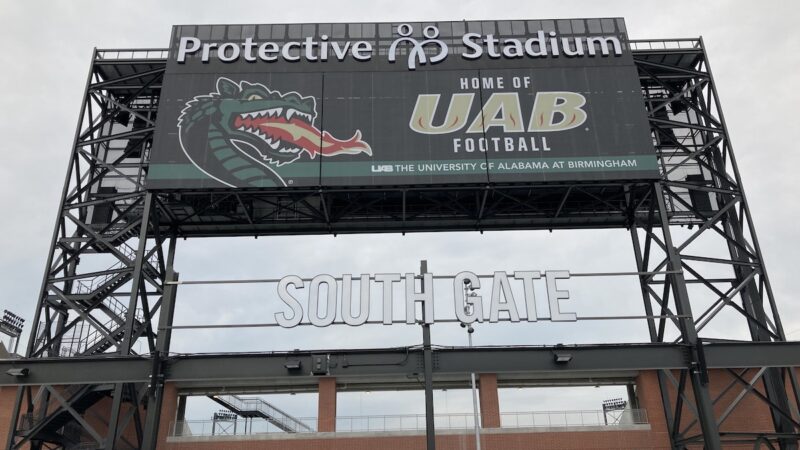Birmingham Council Backing UAB Football With Ticket Buy
The city of Birmingham will purchase 1,000 tickets to every UAB football home game for a total cost of $100,000, the City Council decided Tuesday.
The tickets, which retail between $20 and $45 each, will be dispersed among city employees, youth groups and neighborhood associations, according to a resolution put forth by Mayor Randall Woodfin’s office. The money will come from a hotel surcharge fee passed by the council in 2019.
The decision received pushback from the council’s two most senior members, outgoing District 8 Councilor Steven Hoyt and District 3 Councilor Valerie Abbott.
Hoyt cited the city’s commitment to pay UAB $3 million per year for 30 years, part of the 2018 agreement to construct the just-finished Protective Life Stadium, which will host the first game of the UAB season Thursday.
“We’ve made a tremendous sacrifice of $3 million per year, and I’m just wondering why we’re becoming the welfare place [for UAB]. I don’t know how much more committed we need to be … There are more corporations within the city of Birmingham who could possibly help out with some of this,” Hoyt said. “As they say in the streets, ‘Pimpin’ ain’t easy,’ and I’m telling you, this is pimping to the highest level.”
Abbott, meanwhile, said that the city should instead focus its resources on maintaining city services.
“I love UAB, but they need to go visit somebody else asking for money instead of coming to the city,” she said. “The taxpayers are the ones footing this bill … The citizens want us to stick to our responsibilities, and entertaining ourselves is not one of our responsibilities. It never has been, although we have treated it as if it is one of our responsibilities … We should be providing our services to our citizens first, and if we’re incapable of providing those services, we should not be spending money on other things until we do our jobs.”
But other councilors stressed the economic importance of making sure UAB football games are well-attended.
“I questioned the value in investing in a downtown stadium, but now that we have it, I think it is what it is, and we have to utilize it for the purpose it was intended,” said District 5 Councilor Darrell O’Quinn. “As with many things, you have to look deeper, and in this case, you have to understand that sports is a business — and in this case, there are a lot of economic development opportunities that are very much attached to butts being in seats in that stadium. Filling those seats is a means to an end, which is growing the economy of the city of Birmingham.”
Hoyt responded by arguing that the economic development was not being equally shared with minorities, particularly when it comes to contractors and vendors, arguing that the black-owned restaurant Yo Mama’s was the sole exception.
“Dr. O’Quinn, my conservative councilor, mentioned economic opportunity. Well, who the economic opportunity is for is not for black folk,” Hoyt said. “I’m telling you, get a list of the vendors and see if black folk are included in that. One restaurant is certainly not inclusive.”
District 6 Councilor Crystal Smitherman said she hoped the city-purchased tickets would go out “into the community,” particularly those who could not otherwise afford tickets.
“I want to make sure our people have access to the game and the stadium that they’re going to be paying for for the next 30 years,” she said.
Abbott and Hoyt remained the council’s only two ‘nos’ when a vote was called. Councilors O’Quinn, Smitherman, Clinton Woods, Wardine Alexander and William Parker all voted yes. District 9 Councilor John Hilliard, who is facing challenger LaTonya Tate in Oct. 5’s runoff election, was absent for the second week in a row; District 2 Councilor Hunter Williams also was absent.
Birmingham is 3rd worst in the Southeast for ozone pollution, new report says
The American Lung Association's "State of the Air" report shows some metro areas in the Gulf States continue to have poor air quality.
Why haven’t Kansas and Alabama — among other holdouts — expanded access to Medicaid?
Only 10 states have not joined the federal program that expands Medicaid to people who are still in the "coverage gap" for health care
Once praised, settlement to help sickened BP oil spill workers leaves most with nearly nothing
Thousands of ordinary people who helped clean up after the 2010 BP oil spill in the Gulf of Mexico say they got sick. A court settlement was supposed to help compensate them, but it hasn’t turned out as expected.
Q&A: How harm reduction can help mitigate the opioid crisis
Maia Szalavitz discusses harm reduction's effectiveness against drug addiction, how punitive policies can hurt people who need pain medication and more.
The Gulf States Newsroom is hiring a Community Engagement Producer
The Gulf States Newsroom is seeking a curious, creative and collaborative professional to work with our regional team to build up engaged journalism efforts.
Gambling bills face uncertain future in the Alabama legislature
This year looked to be different for lottery and gambling legislation, which has fallen short for years in the Alabama legislature. But this week, with only a handful of meeting days left, competing House and Senate proposals were sent to a conference committee to work out differences.








